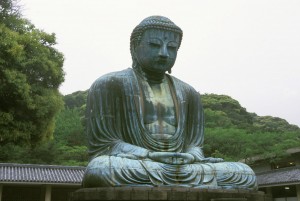“Thousands of candles can be lighted from a single candle, and the life of the candle will not be shortened. Happiness never decreases by being shared.”
–Buddha
 Siddhartha Gautama Buddha, also known as the Buddha lived 500 years before Jesus Christ. Siddhartha, born into a ruling class family, became disillusioned with his royal existence and wanted to experience and discover what reality had to offer. He began to explore the outer world that he had only seen glimpses of from his privileged palace. After breaking free from his confined life he traveled extensively throughout India and Nepal in search of answers to the meaning of life and enlightenment. He spent many years living as a hermit in silent contemplation.
Siddhartha Gautama Buddha, also known as the Buddha lived 500 years before Jesus Christ. Siddhartha, born into a ruling class family, became disillusioned with his royal existence and wanted to experience and discover what reality had to offer. He began to explore the outer world that he had only seen glimpses of from his privileged palace. After breaking free from his confined life he traveled extensively throughout India and Nepal in search of answers to the meaning of life and enlightenment. He spent many years living as a hermit in silent contemplation.
Siddartha became enlightened after many years of contemplation and thought. After his enlightenment, he spent the next 45 years of his life traveling India and Nepal teaching people his wisdom and philosophies on how to live life and avoid suffering. While the Buddha taught many things, there are two things in particular that offer insight and guidance, and are as relevant today as they were over two and a half thousand years ago when he taught them. One of his main teachings was regarding happiness, and how we can self generate a state of love, joy, and serenity internally.
By cultivating the feeling of love he knew that happiness could be manifested internally and the individual no longer had to seek external gratification. He also highlighted the significance of attachment and how it impacted people’s lives and caused suffering. He taught how through non-attachment and the realization of the world’s temporary nature, that one could significantly reduce the amount of pain and suffering in one’s life. These two themes are very applicable to our current society. People search for happiness through material possessions, religion, family, work, success, prestige, status, and power, etc.
We continue to search and yet still feel unsatisfied about what we have or have not achieved. Victor Frankl wrote the book ‘Mans Search for Meaning’, after surviving life in Nazi torn Europe.
Frankl spent time in various concentration camps throughout Germany. After witnessing much suffering and death he came to the conclusion that our task as human beings is not simply to exist and survive but to discover our greater purpose in life. It is easy to get locked into our day to day trivialities and not see the big picture. Many of the world’s most influential leaders, artists, humanitarians, and great communicators all have this common trait. They all believed in a cause greater than themselves, usually something that affects the wellbeing, lives, and consciousness of others. They all understood that happiness and joy come from within, not from our external environment.
Article by Andrew Martin editor of onenesspublishing and author of One ~ A Survival Guide for the Future…
